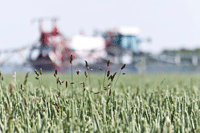What is the Endure project and why does it matter?

What is Endure?
Endure is a €11m project funded by the European Commission to support research into durable crop protection strategies (integrated pest management). It has brought together more than 450 researchers from 18 institutions in 10 European countries.
The Commission wanted the project to establish itself as “a world leader for the development and implementation of durable pest control strategies, and should become recognised as the first point of reference in Europe not only for scientists but also for legislators and users.”
The aim is to provide a more diversified approach to crop protection, reduce the reliance on chemical pesticides, mitigate their negative environmental impacts and improve agricultural sustainability.
Why is integrated pest management so important?
Politicians have increasingly been developing crop protection policies that ensure food production is achieved while protecting human health and the environment.
Indeed, the Sustainable Use Directive, which is currently being implemented across Europe, establishes a new framework to “achieve a sustainable use of pesticides by promoting the use of integrated pest management and of alternative approaches or techniques such as non-chemical alternatives”.
Member states have to ensure the general principles of IPM are implemented by growers by 2014, so the Endure project and its results have become increasingly relevant.
What were Endure’s key objectives?
First, to build a lasting crop protection research community. This has been achieved with the announcement Endure will continue without the EU funding, which runs out this month, with the formation of an Endure European Research Group.
The project has identified future research priorities through a foresight study, and identified gaps in current knowledge and harmonised research programmes to cover those issues.
It has also built a useful library of tools and resources for researchers to use in its “Virtual Laboratory”, and set up links with the adviser community to help put the research into practice.
The project also aimed to identify short-term solutions that could optimise and reduce pesticide use by exploiting current knowledge. Endure has used case studies to demonstrate the feasibility of changing practices and transferring crop protection methods for specific crop/pest problems.
Endure has also looked at longer-term strategies, including revisiting the basic design of agricultural systems and generate innovative ideas.
Prospective strategies are analysed using a tool that takes into account criteria significant for the environment, farm economics and society as a whole.
What are the eight IPM principles?
Measures for prevention and/or suppression of harmful organisms
Tools for monitoring
Threshold values as basis for decision-making
Non-chemical methods to be preferred
Target-specificity and minimization of side effect
Reduction of use to necessary levels
Application of anti-resistance strategies
Records, monitoring, documentation and check of success
* Pests = weeds, diseases and pests
More from the Endure conference
Four on-farm steps to integrated blight control
IPM case study: Danish grower calls for cost-effective non-chemical tools
Pesticide reduction of 50% achievable in UK
Eurowheat website provides disease control encyclopaedia Endure calls for advisers to join

